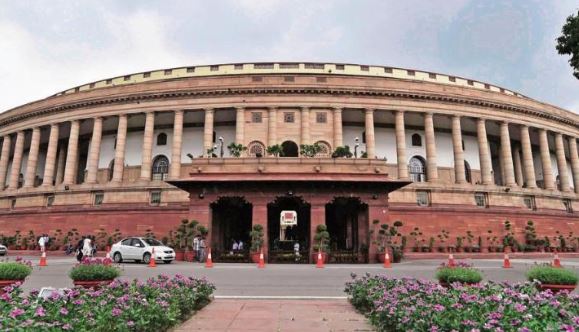 Lok Sabha on Monday passed the Arms (Amendment) Bill, 2019. The Bill seeks to enhance the punishment for existing offences like illegal manufacture, sale, transfer, etc.; illegal acquiring, possessing or carrying prohibited arms or prohibited ammunition; and illegal manufacture, sale, transfer, conversion, import, export, etc., of firearms. It also proposes to define new offences and prescribing punishment for them, such as for taking away firearms from police or armed forces, involvement in organized crime syndicate, illicit trafficking including smuggled firearms of foreign make or prohibited arms and prohibited ammunition, use of firearms in rash and negligent manner in celebratory gunfire endangering human life, etc. Further, the Bill seeks to enhance the period of arms license from three years to five years and also to issue arms license in its electronic form to prevent forgery.
Lok Sabha on Monday passed the Arms (Amendment) Bill, 2019. The Bill seeks to enhance the punishment for existing offences like illegal manufacture, sale, transfer, etc.; illegal acquiring, possessing or carrying prohibited arms or prohibited ammunition; and illegal manufacture, sale, transfer, conversion, import, export, etc., of firearms. It also proposes to define new offences and prescribing punishment for them, such as for taking away firearms from police or armed forces, involvement in organized crime syndicate, illicit trafficking including smuggled firearms of foreign make or prohibited arms and prohibited ammunition, use of firearms in rash and negligent manner in celebratory gunfire endangering human life, etc. Further, the Bill seeks to enhance the period of arms license from three years to five years and also to issue arms license in its electronic form to prevent forgery.
The Amendment assumes significance in recent times as Law enforcement agencies have indicated growing nexus between possession of illegal firearms and commission of criminal offences. With the advancement in technology, the fire power and sophistication of illegal firearms have increased significance over the years. The trans-border dimensions of illegal arms trafficking are causing threat to internal security and to prevent the usage of illicit firearms so trafficked has also become a prime concern. To effectively curb crimes related to or committed by using illegal firearms and to provide effective deterrence against violation of law, there is an urgent need to strengthen the existing legislative framework by making appropriate amendments in the Arms Act, 1959. Simultaneously, there is also a requirement for rationalizing and facilitating the licensing procedures for use of firearms by individuals and sports persons.
Allaying fears regarding Union government stepping into State governments’ domain by amending this Act, Union Home Minister Amit Shah said that the Bill did not usurp the rights of states because in India’s Constitution, Arms, firearms and explosives are in the Union List. He added that regulation of firearms is essential for a law abiding, peaceful society.
Talking about the history of the Act, Shah said that the original law was brought by the British after the Revolution of 1857, in order to prevent such an incident in the future. He added that Gandhi also connected the issue of arms ownership with basic rights of Indians and demanded repeal of the Indian Arms Act, 1878, and this demand was included in the eight-point agenda that Gandhi presented to Lord Irwin. He also said that after independence, it was deemed that there was no need for an armed revolution, and the responsibility of the protection of people would be that of the State, which led to evolution of and amendments in the law.
Shah assured the House that the licenses and arms ownership of sportspersons would not be adversely affected because of the Bill and added that in fact the number and types of weapons allowed for sportspersons has been increased. He also remarked that provisions related to ownership of arms by retired and serving personnel of armed forces remains unaffected by the Amendment.
Speaking on the enhanced punishment under the Amendment, Shah said that prison sentence for illicit trafficking of firearms and ammunition including smuggled firearms of foreign make or prohibited bore had been increased to prison time between 10 years to life imprisonment. Shah said that the theft of weapons from police or armed forces would carry a punishment of 10 years to life imprisonment; illegal manufacturing, sale, conversion, repair, import/export would attract 7 years to life imprisonment; acquiring, possessing, carrying prohibited arms and ammunition to get 7 to 14 years imprisonment; involvement in organized crime syndicate would all henceforth carry the punishment of 10 years to life imprisonment. He also said that involvement in negligent and rash use of firearms or in celebratory firing endangering human life, would attract a fine of Rs. 1,00,000 or imprisonment for 2 years or both.













